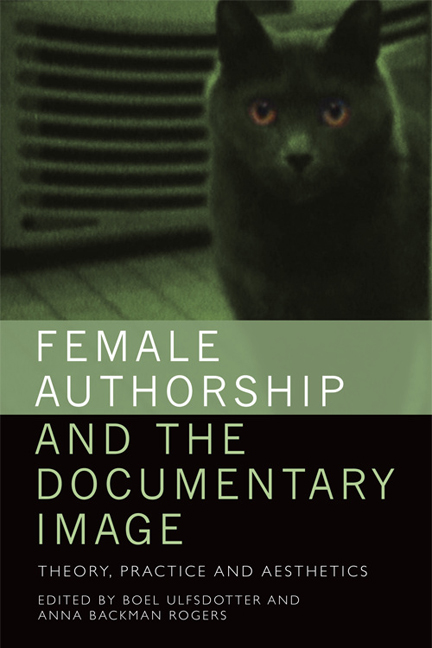Book contents
- Frontmatter
- Contents
- List of Illustrations
- Notes on the Contributors
- Foreword
- Introduction
- PART ONE DOCUMENTARY PRACTICES
- PART TWO DOCUMENTARY THEORIES
- PART THREE FEMALE AUTHORSHIP AND GLOBAL IDENTITIES
- ‘Being a Woman Documentary Maker in Taiwan’ – An interview with Singing Chen and Wuna Wu
- Select Bibliography
- Index
‘Being a Woman Documentary Maker in Taiwan’ – An interview with Singing Chen and Wuna Wu
Published online by Cambridge University Press: 05 May 2021
- Frontmatter
- Contents
- List of Illustrations
- Notes on the Contributors
- Foreword
- Introduction
- PART ONE DOCUMENTARY PRACTICES
- PART TWO DOCUMENTARY THEORIES
- PART THREE FEMALE AUTHORSHIP AND GLOBAL IDENTITIES
- ‘Being a Woman Documentary Maker in Taiwan’ – An interview with Singing Chen and Wuna Wu
- Select Bibliography
- Index
Summary
Taiwan has a thriving documentary sector, with ‘women making up a large part of the documentarian population’. The development of the sector can be traced back to the political activism of the 1980s, for, in an era when martial law and strict censorship still prevailed, activist video was a crucial means of spreading alternative information and contesting the government-controlled media. Following the end of martial law in 1987 and the development of a liberal, multi-party democratic system, a broad range of independent documentaries engaged with the burgeoning social movements of the time began to be produced in the 1990s. As the dramatic feature film industry went into decline for various reasons, documentary became an even more important means of satisfying Taiwanese audience demand for audio-visual narratives about their own lives and society. In addition to community-based screenings, feature-length documentaries began to get theatrical releases, and the Public Television Service (PTS) channel became an important platform and source of sponsorship. More recently, a third phase of films that are more personal, and more concerned with the aesthetics of documentary has emerged.
The prominent role of women in the documentary sector is part of a larger trend in Taiwanese society. Both of the main candidates in the 2016 presidential election were women, until a last minute change of candidate by the KMT Nationalist Party. However, selecting a man did not help the KMT, and Tsai Ing-wen (蔡英文) of the Democratic Progressive Party (DPP) was elected as the island's first female president. When I visited Taipei in November of 2015, I discovered a large number of women are playing prominent roles in the film industry more widely, too. When we consider that there are no women directors among the Taiwan New Cinema generation that includes Hou Hsiao- Hsien (侯孝賢) and Edward Yang (楊德昌), this is a remarkable shift. Among the important female players in the industry that I met in 2015 were Jennifer Jao (饒紫娟), Director of the Taipei Film Commission; and Yeh Juh-Feng (葉如芬), head of the Production Department of MandarinVision (華文創), a leading production, distribution, sales and talent management company set up in 2012 by another leading woman in the Taiwan film industry, Jessie Ho (何琇瓊).
- Type
- Chapter
- Information
- Female Authorship and the Documentary ImageTheory, Practice and Aesthetics, pp. 205 - 213Publisher: Edinburgh University PressPrint publication year: 2018

